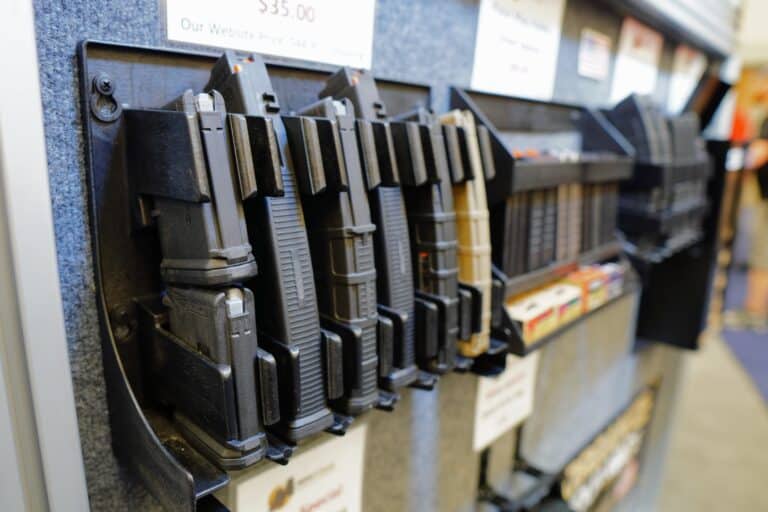Two state courts in the Pacific Northwest gave gun-rights advocates some good news in challenges against magazine capacity restrictions this week. But is that sustainable?
On Friday, the Oregon Court of Appeals denied a request by the state’s attorney general to stay a lower court ruling declaring the state’s voter-approved ban on “large-capacity” magazines and permit requirement to purchase a firearm unconstitutional. It did so after finding that the gun-rights groups who challenged Measure 114 have “a legitimate likelihood of success on the merits” in the appeals process and that preventing the state from enforcing the measure merely preserves the status quo.
“Although the court acknowledges that the measure itself is intended to address an issue of great importance to the public, the motion does not present a sufficient basis to conclude that there is a nonspeculative likelihood of harm that will occur during the pendency of the appeal in the absence of a stay,” the court wrote in Arnold v. Kotek.
Meanwhile, just a few days prior, a Cowlitz County judge in Washington struck down the Evergreen State’s version of the ban as unconstitutional under both the state and US constitutions.
“This Court finds that an arm designed as a weapon and traditionally or commonly possessed in anticipation of self-defense is presumptively a protected arm in Washington State,” Superior Court Judge Gary Bashor wrote in State of Washington v. Gator’s Custom Guns. “The State must provide some history of regulation in line with the requirements of Bruen in order for Art. 1, § 24 to provide at least the protection of the right the Second Amendment does. The State has failed to do so.”
The two favorable rulings for gun-rights activists stand in stark contrast to the experience they have faced thus far in federal courts litigating similar restrictions.
With the exception of a since-stayed district court ruling striking down California’s ban, virtually all federal decisions in magazine ban cases issued since the Supreme Court’s Bruen decision have sided with the government—including cases involving the Washington and Oregon bans. That’s largely because federal judges with similar ideological predilections typically superintend the places that pass hardware bans, and judges across the country have already deployed a common analytical framework for upholding hardware bans under the Bruen test.
Success in state courts, by comparison, modest as it may be at this stage, could raise the question of whether state constitutional challenges offer more promise to litigants challenging hardware bans.
But there are reasons to be skeptical.
For one, many of the same issues involving ideological sympathy toward upholding local gun restrictions exist in state courts as they do in federal circuits, if not more so.
Though the judge struck down Washington’s magazine ban was on the merits, his ruling was almost immediately stayed thanks to some behind-the-scenes maneuvering by the state’s Attorney General and its Supreme Court. That progressive-leaning court will now take up the case on appeal. And though the Oregon ruling did not give similar deference to its state attorney general, the next court to set to review the law is made up entirely of Democratic appointees.
Additionally, state constitutional analysis is something of a wildcard. State courts, including those in places with their own state constitutional arms guarantees, are not necessarily bound to interpret restrictions on those guarantees through the same Bruen-inspired legal analysis that federal courts are. That leaves a lot of room for a wide variety of analytical frameworks.
Some states, including Iowa, Alabama, Louisiana, and Missouri, have adopted voter-approved requirements that state courts use strict scrutiny when reviewing challenges to gun laws under their respective state constitutional arms guarantees. That standard is the most stringent tier of scrutiny for government action in constitutional challenges under the interest-balancing framework–one rejected by the Supreme Court in Bruen. A restriction must be “narrowly tailored” or the “least restrictive means” of achieving a “compelling governmental interest” to pass muster under strict scrutiny, a bar the government fails to clear more often than not.
On the other end of the spectrum, the Supreme Court of Hawaii held last year ruled that the state’s constitutional arms provision does not protect any individual gun rights despite being effectively identical to the federal Second Amendment.
“Article I, section 17 of the Hawaiʻi Constitution mirrors the Second Amendment to the United States Constitution,” the Hawaiian court wrote in Hawaii v. Wilson. “We read those words differently than the current United States Supreme Court. We hold that in Hawaiʻi there is no state constitutional right to carry a firearm in public.”
“The text of article I, section 17, its purpose, and Hawaiʻi’s historical tradition of weapons regulation support a collective, militia meaning,” the court added.
Meanwhile, Judge Bashor based his approach to Washington’s state arms rights provision on the Supreme Court’s analyses in Heller and Bruen.
“The Washington Supreme Court, through Evans and Sieyes, has adopted the US Supreme Court approach which prohibits balancing tests when analyzing general laws limiting rights under Art. 1, § 24,” he wrote.
In other words, state constitutional interpretations of the right to keep and bear arms run the gamut. While gun-rights activists may achieve individual victories at the state level, the federal courts will probably continue to be their best hope for lasting success. After all, the Second Amendment and the Supreme Court’s interpretation of it ultimately set the floor for what types of gun restrictions are permissible in all 50 states.






